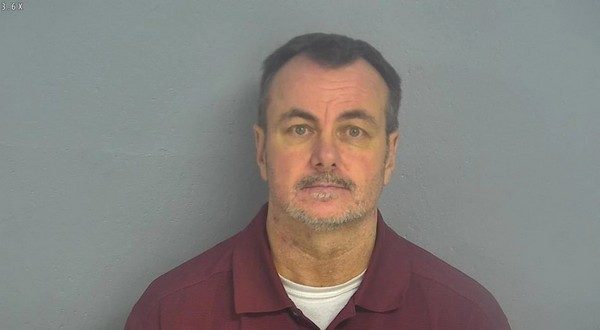
Photo: Roy G. Harris Jr.
SPRINGFIELD, Mo. – A Rogersville man was sentenced in federal court Wednesday for three separate cases in which he was convicted of child sexual exploitation, a nearly $1 million investment fraud scheme and illegally possessing 19 firearms.
Roy G. Harris Jr., 57, was sentenced by U.S. Chief District Judge Beth Phillips to 30 years in federal prison without parole. Harris was sentenced to 20 years on the child exploitation offenses, five years on the wire fraud offense and five years on the firearms offenses, for a total of 30 years.
The court also ordered Harris to pay $809,260 in restitution to the victims of his wire fraud scheme and $5,000 to the victim of his child sexual exploitation and child pornography crimes.
On Feb. 27, 2019, Harris pleaded guilty to a one-count indictment charging him with wire fraud. He was indicted in a second case on Aug. 23, 2019, and on a third case on March 23, 2021. On Aug. 3, 2021, Harris pleaded guilty to all three counts of the second case — one count of being a felon in possession of a firearm, one count of possessing an illegal firearm and one count of unlawfully possessing an unregistered firearm. On Aug. 19, 2021, Harris pleaded guilty to both counts of the third case — one count of the sexual exploitation of a minor and one count of receiving and distributing child pornography.
Regarding his wire fraud conviction, Harris admitted that he engaged in an investment fraud scheme from June 2014 to May 2017. The total loss to victims of his fraud was at least $921,250. Harris has paid back some of the money to various investors.
Harris was the owner of two limited liability companies, Orthogistic, LLC, and Amniogistic, LLC. He was also the owner of a corporation, Orthogistic Labs, Inc. He solicited investments from individuals, including a victim identified in court documents as “P.K.,” a resident of New Jersey who invested $60,000 in Orthogistic Labs, Inc. Harris made representations to these individuals that he knew were false and used some of the money obtained from his victims for other purposes and for his personal benefit. Harris failed to tell investors that he had been convicted in 2002 of the felony crimes of fraud in the sale of a security, deceptive business practice and stealing. In some cases, he told potential investors, including P.K., that he did not have any prior criminal charges or convictions for theft or related offenses.
After pleading guilty to wire fraud, Harris was in possession of 19 firearms, including 12 rifles and seven pistols, which were at his residence. One of the rifles, which was not registered, had a short barrel length and did not have a stock designed to be fired from the shoulder. Under federal law, it is illegal for anyone who has been convicted of a felony to be in possession of any firearm or ammunition.
While investigating the firearms offenses, law enforcement officers searched two iPhones that belonged to Harris. The phones contained images and videos of child pornography. Among them was an image of a victim under the age of 15 whom Harris met online and solicited to engage in sexual activity.
While awaiting trial on his firearms and sexual exploitation charges, Harris solicited at least one individual to murder several witnesses related to the firearms charges. Harris made video calls from the Greene County Jail to another person, whom he asked for assistance with murdering several people so that he would not have to serve a lengthy prison sentence. Harris offered to pay him with property, including a motorcycle.
These cases were prosecuted by Assistant U.S. Attorney Casey Clark. They were investigated by the U.S. Postal Inspection Service, the Bureau of Alcohol, Tobacco, Firearms and Explosives, the FBI, the Southwest Missouri Cyber Crimes Task Force and the Missouri Securities Division.
Project Safe Neighborhoods
This case is part of Project Safe Neighborhoods (PSN), the centerpiece of the Department of Justice’s violent crime reduction efforts. PSN is an evidence-based program proven to be effective at reducing violent crime. Through PSN, a broad spectrum of stakeholders work together to identify the most pressing violent crime problems in the community and develop comprehensive solutions to address them. As part of this strategy, PSN focuses enforcement efforts on the most violent offenders and partners with locally based prevention and reentry programs for lasting reductions in crime.
Project Safe Childhood
This case was brought as part of Project Safe Childhood, a nationwide initiative launched in May 2006 by the Department of Justice to combat the growing epidemic of child sexual exploitation and abuse. Led by the United States Attorneys’ Offices and the Criminal Division’s Child Exploitation and Obscenity Section, Project Safe Childhood marshals federal, state, and local resources to locate, apprehend, and prosecute individuals who sexually exploit children, and to identify and rescue victims. For more information about Project Safe Childhood, usdoj.gov/psc. For more information about Internet safety education, visit usdoj.gov/psc and click on the tab “resources.”
WebReadyTM Powered by WireReady® NSI










